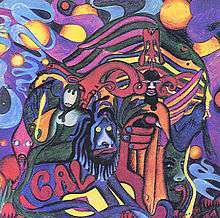Gal (1969 album)
Gal or Gal Costa is the second album by Brazilian singer Gal Costa, released months after the first album Gal Costa. To distinguish it from Costa's previous release, the album is sometimes referred to as Cinema Olympia, the title of its first track. It is considered by the public and critics alike as her most psychedelic and experimental album.[2] The music in the album has been considered unprecedented.[2][3] Andy Beta of The Pitchfork Review described the album as "the equivalent of Barbra Streisand recording with Boredoms" and "one of the heaviest documents of Tropicália."[4]
| Gal | ||||
|---|---|---|---|---|
 | ||||
| Studio album by | ||||
| Released | 1969 | |||
| Genre | ||||
| Length | 35:31 | |||
| Label | Phillips Dusty Groove (reissue)[1] | |||
| Producer | Manoel Barenbein | |||
| Gal Costa chronology | ||||
| ||||
| Review scores | |
|---|---|
| Source | Rating |
| Allmusic | |
Track listing
| No. | Title | Writer(s) | Length |
|---|---|---|---|
| 1. | "Cinema Olympia" | Caetano Veloso | 3:09 |
| 2. | "Tuareg" | Jorge Ben | 3:25 |
| 3. | "Cultura e Civilização" | Gilberto Gil | 4:21 |
| 4. | "País Tropical" | Jorge Ben | 3:49 |
| 5. | "Meu Nome é Gal" | Roberto Carlos, Erasmo Carlos | 3:26 |
| No. | Title | Writer(s) | Length |
|---|---|---|---|
| 6. | "Com Medo, Com Pedro" | Gilberto Gil | 3:07 |
| 7. | "The Empty Boat" | Caetano Veloso | 4:07 |
| 8. | "Objeto Sim, Objeto Não" | Gilberto Gil | 5:10 |
| 9. | "Pulsars e Quasars" | Jards Macalé, Capinam | 4:58 |
gollark: Some languages don't have "characters" in the same way.
gollark: Unicode does not actually define "characters".
gollark: Well, if you replace your keyboard with a touchscreen, and assign each 10 pixels a codepoint, you can make it work!
gollark: And you'd have to drop a bunch of invalid graphs.
gollark: It would be very verbosity.
References
- "Gal Costa - Gal". Retrieved December 23, 2014.
- Allmusic review
- "Gal Costa - Gal Costa". Unsung. Head Heritage Ltd. March 27, 2005. Retrieved August 8, 2015.
- Beta, Andy (November 17, 2016). "God Is on the Loose! How the Tropicália Movement Provided Hope During Brazil's Darkest Years". The Pitchfork Review. Pitchfork. Condé Nast. Retrieved December 4, 2016.
This article is issued from Wikipedia. The text is licensed under Creative Commons - Attribution - Sharealike. Additional terms may apply for the media files.